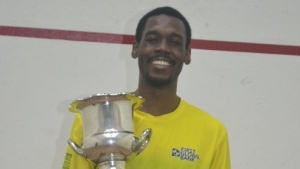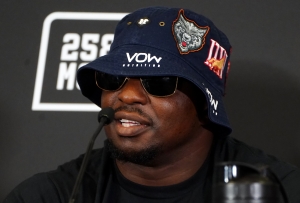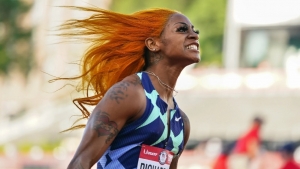Anthony Joshua has acknowledged there is a doping problem in boxing but is unsure whether longer bans are the best solution for a cleaner sport.
Joshua was set to fight old rival Dillian Whyte at London’s O2 Arena on Saturday, but Whyte had to be pulled from the bout after “adverse analytical findings” were discovered in his doping test by the Voluntary Anti-Doping Association (VADA) and he now aims to prove his innocence.
It saw 39-year-old Robert Helenius drafted in as a last-minute opponent but the elephant in the room for Joshua’s latest fight week is the worrying trend of positive tests in the sport.
During the past 18 months British duo Amir Khan and Conor Benn have failed drugs test and while Benn’s suspension was lifted last month, pending an appeal by UK Anti-Doping, it adds to the long list of boxers to fail tests with Tyson Fury and Saul ‘Canelo’ Alvaraz previously serving suspensions.
Joshua reflected on the darker side of the sport ahead of this weekend’s fight with Helenius and says targeting local gyms would help get to the root of the problem.
“There is a doping problem in the sport, definitely,” Joshua said.
“I can’t speak on the numbers, I don’t really mix inside the boxing industry. I don’t know but it’s a problem.
“Am I surprised? It happens in boxing. It’s not the first and won’t be the last, so no, I was not surprised to be honest.
“It is a dangerous sport but I am not disgusted. Boxing is not an institution where you join a club and everything is presented to you, these guys go to local gyms and they are around people who might be doing dodgy stuff so you have to be very, very responsible.
“I hope it is a mistake (for Whyte) but it shows why I have to invest in these tests and the team have now got Helenius tested because it is important because this stuff happens.
“It doesn’t fill me with anger, no, but it’s not good. I don’t think we just need longer bans, I think we need to look at it at the root.
“I don’t know the solution but I always mind my Ps and Qs because I don’t want my reputation damaged.”
Joshua is no stranger to seeing his opponent embroiled in a doping storm after Jarrell Miller failed a test ahead of their planned 2019 fight, which subsequently saw Andy Ruiz Jr given a chance and produce a huge shock victory at Madison Square Gardens to become world champion.
Miller would later serve a suspension and test positive again a year later but it has not stopped him accusing Joshua of doping.
Brixton boxer Whyte, meanwhile, has already served a two-year doping ban in 2012 and yet has taken aim at his British rival in the past with accusations of Joshua being “the Lance Armstrong of boxing” in 2019.
Joshua questioned: “How can people get away with doping if you are getting random drug tests?
“I get drug-tested all year round. Every quarter I have to submit my whereabouts, where I am going to be, every day, for every hour of the day so they can turn up randomly.
“I have submitted that every day of my life since 2011. So, I don’t know why I am under this pressure but all these other boxers aren’t?
“When you sign up to a promoter, they should all have that in the deal. It damages the sport. Look where we are at with this situation, we lost the fight and nearly lost the card because of this situation.
“I have a long history of being drug-tested and sometimes you have to question the person who keeps pointing the finger.
“It’s funny that the two people who have accused me have popped dirty themselves.
“Maybe they did it because of my physique or my success, my rise. It maybe didn’t make sense to them but it’s God-gifted and a lot of hard work.”
Joshua first found out about Whyte’s failed test on Saturday morning and despite wanting to fight at O2 Arena, he would never have stepped in the ring with the south Londoner after learning of his test results.
“I don’t know what Dillian supposedly took,” Joshua said.
“(But) I wouldn’t fight him on drugs, no way. It’s not right, it’s not morally right.
“I was drug-tested in our previous fight, I have been drug-tested since 2011, I don’t know if he was on drugs when he boxed before, but I won.”
































